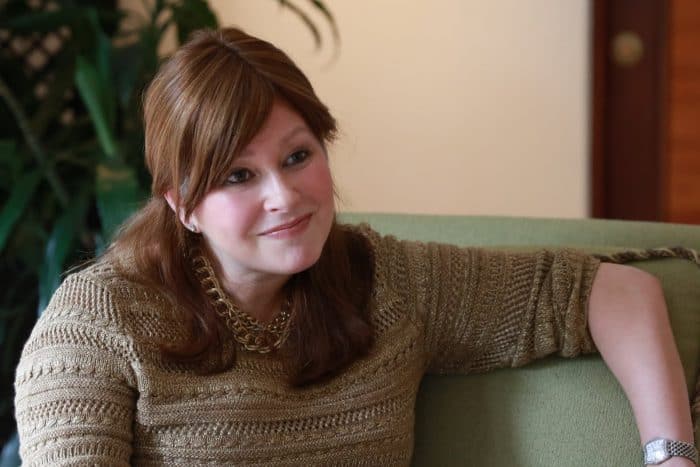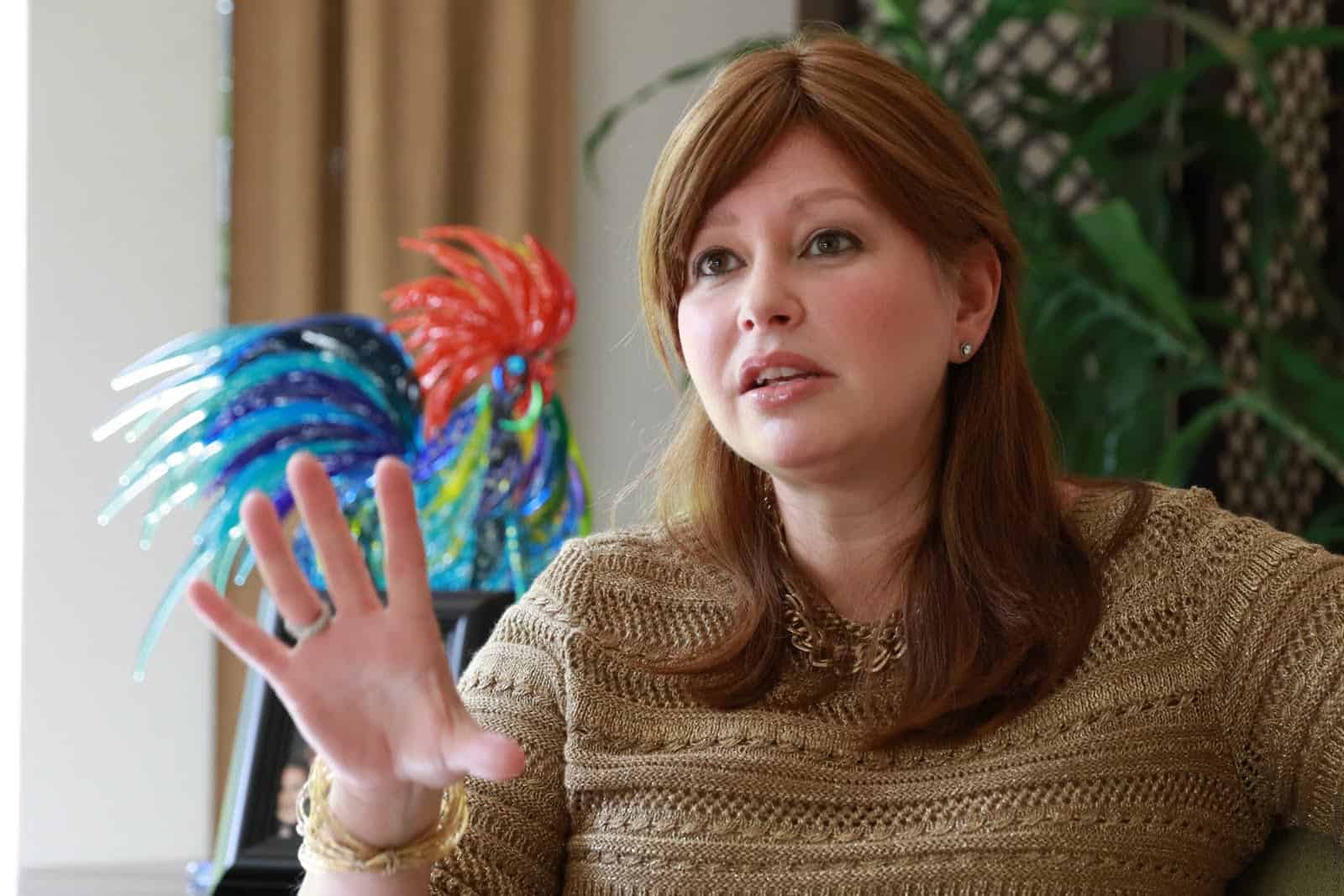Andrea Haney is 41, a Rabbi in the Conservative Movement in Judaism, wife of U.S. Ambassador to Costa Rica S. Fitzgerald Haney and mother of four children aged 3 to 13.
She’s also a human being made up of cells, some of which went haywire and led to her diagnosis earlier this year of stage 3 breast cancer.
“We were in Israel at the time,” Haney said in an interview with The Tico Times at the U.S. Ambassador’s residence in Escazú.
“And I felt … I don’t want to call it a lump because I think that’s misleading. They always say you find a lump and you expect this magical, cartoonish, sort of pointed thing that says, ‘Ding ding ding.’ That didn’t happen for me. It was a really large mass that I assumed was because I was weaning my fourth child and I thought, ‘Oh, clogged milk duct. That must be what this is.'”
Haney went to the doctor, who sent her to have a mammogram and an ultrasound — all of this in a foreign country, by herself. Her husband was in the U.S. at the time.
The results were not good. The mass was large and malignant, and the cancer had already spread to her lymph nodes.
Haney was shocked. She had always heard that nursing your children helped protect against breast cancer. She took care of herself and she didn’t have any history of breast cancer in her family. And yet, there it was.
“Hearing that you have stage 3 cancer at the age of 41 with four small children, that’s a pretty terrifying thing to have to hear and face,” Haney said.
Now, seven months later, Haney has just finished chemotherapy, which she started in Israel and finished in Costa Rica at the Costa Rican Institute of Oncology (ICOT).
“My husband got sworn in [in June], we flew down here, we’re meeting everyone, and a few days later I was getting hooked up to the IV over at the ICOT.”
Now Haney is preparing to undergo a lumpectomy and removal of some of her lymph nodes, followed by six weeks of radiation therapy and then hormone treatment “probably for the rest of my life,” she said.
Haney cannot yet call herself a breast cancer survivor. She’s in the thick of her battle against the disease, like millions of other women around the world.
In Costa Rica, breast cancer is the second most common cancer affecting women behind skin cancer. More than 1,000 women here were diagnosed with breast cancer in 2012, according to health authorities.
But breast cancer is the most deadly cancer for women here, claiming 331 lives last year.
More disturbing, the number of women in Costa Rica who died from breast cancer rose 24 percent between 2000 and 2013, according to data from the Costa Rican Social Security Administration.
Haney recently decided to share her story publicly in hopes of contributing to a more informed understanding of the disease, and to lend strength and hope to other women battling breast cancer.
“I don’t believe this happened for a reason,” Haney said, “but I’ll make a good reason for this to have happened.”
The following is Haney’s interview with The Tico Times, edited, in some cases, for clarity:
TT: When you got the diagnosis, how did you go about telling people in your life and especially your kids?
AH: I think the first few days we were devastated. We allowed ourselves maybe a week or so of just complete pity and feeling sorry for ourselves and taking in the devastating news. After that, you have to realize life goes on and, “How are we going to make this work?”
We had a family meeting and I just sat [the kids] down and I needed to make sure they knew that I was going to be OK, and that it was going to be challenging and difficult but that we were going to get through this as a family. And the kids have been amazing. I would never want this for my kids, but they have handled it, they’ve been brave, they’ve been funny about it — there’s a sense of humor in it sometimes.
It affects everybody, I think that’s what’s so hard about this. If I could just take this all on myself, I would. But it affects everyone who’s in orbit in your life.
Was it a hard decision to come here in the middle of treatment?
It wasn’t a hard decision. First, I feel lucky that I have such great doctors and access to such incredible care. The treatment here has been world-class.
[My husband] asked me. It was definitely like, “I don’t have to do this. What do you want to do?” But I believe in him so much and I believe that he has so much to offer in this world that I would never want to stand in his way.
I knew that at the end of this, cancer wasn’t going to define my future. We were going to live our lives and he was going to do the good work that I really believe he is intended to do.

How are you feeling now?
I feel good. Next week I go for surgery, so that’s intense. I’m going to be gone for 10 days from my kids. My husband’s coming with me. And it’s going to be OK.
Why did you decide you wanted to share your story with the public?
I just thought if there’s some good that comes out of this, that sort of makes it all worth it. If this can encourage someone, maybe someone who’s nursing and thought, “Oh, I thought I was immune. How can you get cancer if you’re nursing?” Well, apparently you can.
I want people to know that we all have our struggles, and you never know what people are going through. Most people would have assumed we’re coming to Costa Rica, my husband has this very challenging and exciting position ahead of him. They wouldn’t even think that every Friday he’s sitting with me for four hours holding my hand while I get a chemo drip.
We all have something. It doesn’t have to be cancer, necessarily, we all have battles, and so people should be kind to each other and compassionate.
What have you learned that you want to share with women who could have breast cancer in the future or who are in early stages of breast cancer?
I would want them to know that they’re not alone. I would want them to know that it’s OK to be scared. I would want them to know that they should be hopeful because we’re lucky, there’s so many advances in medicine. And I would want them to know that they can do this, that they can beat this, and that they can live the life they’ve always dreamed of, not just despite the cancer, but because of the cancer.
It’s going to focus them on what’s important, it’s going to make them reevaluate their lives and their priorities. It’s going to make them slow down and have to take care of themselves.
It sounds so trite but cancer is just, it’s all-consuming. It takes over everything and I think we need to put it back in its place. These are cells and we’re much more than a bunch of cells. We’re bigger and stronger and we have a lot more resources. That can be faith, that can be meditation practices, that can be your diet. There are so many things to draw upon which can help someone.
There has been such conflicting information in recent years for women on when we should have mammograms, whether we should have them. I feel like it’s gotten really confusing.
People are confused and that’s unfortunate. But I think women need to be in tune with their bodies and they need to be their own advocates. They need to do their monthly examinations and if anything doesn’t feel right, if there are any changes, they need to act on that immediately because early detection is key.
We need to empower ourselves to take responsibility for our bodies to do whatever we need to do to get the help that we need.
I imagine you had periods when you were going through chemo where you weren’t feeling well and didn’t have a lot of energy. How did you deal with that as a mom?
You don’t have the luxury to say, “I don’t want to be a mommy today.” My kids were going through enough with having to move across the world and having to go to a new school and having to learn a new language. When they came home from school, it didn’t matter how tired I was, I was going to put on some blush to take away the green; I was going to be there to help them.
But they also knew if I had to go to bed early. I think at some point I just stopped with the wigs and they knew that it was just because it hurt or it was too hot and they were OK with that.
It seem like having to be mom could be helpful because it forces you to keep it together.
When they were in school, I could stay in bed and I could easily go into a dark place. So I think there’s something about the normalcy of routine, of them coming back and the whirlwind of backpacks flying everywhere and, “What’s for lunch?,” “I don’t like this.” You know, it takes you out of yourself. And I think that’s one of the most important things you can do.
Whenever you start to feel sorry for yourself, you need to think about other people. And so the kids were a perfect distraction for me to focus on what I love most, and that’s them and their happiness and their well being.
Life is precious, and I think there’s definitely a greater appreciation of that in my household now.
How has your faith helped you through this process?
I’m lucky because I have a strong faith. It helps me to heal and it gives me comfort. I’m uncomfortable when people say God does everything for a reason. I don’t believe this happened for a reason, but I’ll make a good reason for this to have happen.
This is just bad luck. Our job as people is to transform it into something good.
What are some of your goals for the near future?
I want to be doing my daily meditation. I want to be eating correctly. I want to keep my gratitude journal. [The Haney family members all keep gratitude journals to remind them of what they’re thankful for.]
I want to breathe. I want to appreciate the little things. I want to go to beaches with my kids. You know, just silly things, just appreciate life. And I want to get through this surgery with as much serenity as I possibly can, and I want to then focus on the bigger issues.
And after this whole cancer thing hopefully passes, then it’s about, “How do I transform this whole experience into something that can be positive?”






